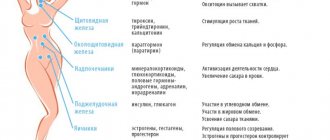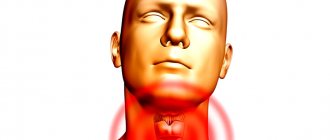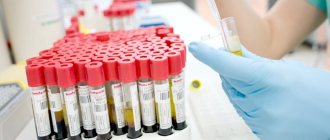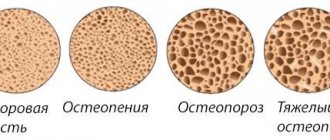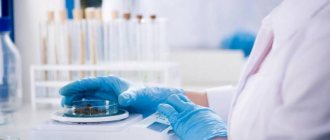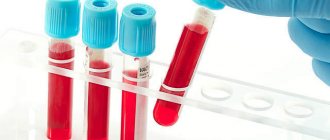Testosterone
Belongs to androgens or steroids, produced in the adrenal glands and testes.
Can be of two types: 1. Active. It moves throughout the body and penetrates cells without any obstacles. Constitutes 2% of total testosterone. 2. Bound. Proteins perform the function of transportation, delivering the active substance to target organs. It is in proteins that binding occurs. The percentage in the body is 98%.
The level of testosterone in the body depends on several points:
1. Age of the man . Young – 300-1000 ng/l, over 60 – decreases by half. 2. Seasonality. The increase is observed in the fall. 3. Time of day . In the evening, there is a decrease in hormone levels by 13%, in the morning – an increase.
Progesterone synthesis begins in boys at the age of 13 years. He:
• responsible for hair growth; • development of the musculoskeletal system and genital organs; • affects spermatogenesis and the ability to ejaculate; • responsible for libido and voice loss.
The pituitary gland controls hormone levels. Read the article about what other hormones are produced in the pituitary gland.
If the male sex hormone testosterone is elevated, this may indicate the presence of:
• increased physical activity; • endocrine type tumors; • Itsenko-Cushing syndrome; • genetic disorders.
If high testosterone is not detected in time, it is possible:
• development of infertility; • rapid growth of body hair (hirsutism); • alopecia (on the head); • apnea; • formation of blood clots; • neoplasms in the prostate of a malignant nature; • mental state disorder; • the appearance of acne on the face.
Low testosterone can be caused by:
• dysfunction of the pituitary gland, testicles, hypothalamus; • Alzheimer's disease; • obesity; • taking steroid drugs; • prolonged smoking and consumption of alcoholic beverages.
Also, a decrease in androgen levels is negatively affected by physical inactivity, an incorrect approach to nutrition, frequent stress and nervous strain.
The main manifestation of hormone deficiency is the formation of a female-type figure in a man. With low testosterone levels, reproductive function declines, so if infertility is suspected, this test is often prescribed.
Preparing for analysis:
1. The donation of biomaterial is carried out in the morning and only on an empty stomach. 2. 10 hours before the test you need to refuse food and even water. 3. Avoid stress and intense physical activity.
More detailed information on preparing for analysis is contained in the article.
Hormones that affect testosterone levels:
LH
(). Triggers the synthesis of androgens by Leydig cells located in the testicles. LH levels increase when androgens are low and decrease when testosterone levels are high through negative feedback. It is this feature that provokes inhibition of the testes’ own production of androgens during hormonal replacement therapy.
FSH
(). It increases the synthesis of androgens in the blood by increasing LH receptors, but its main function is to stimulate spermatogenesis. FSH levels are controlled through feedback by inhibin secreted by Sertoli cells.
HCG, hCG
(). Normally, hCG is not found in men or is present in a small amount (0-5 mIU/l). High concentrations of this hormone may indicate a hormone-producing tumor. HCG has the properties of LH and FSH, but the luteinizing activity of hCG is significantly superior to follicle-stimulating, which makes it possible to use hCG injections as stimulating hormone therapy.
Together, LH, FSH and hCG make up a group of gonadotropic hormones produced by the anterior pituitary gland. It is gonadotropic hormones that are responsible for regulating the functions of the gonads.
Prolactin
produced by the anterior lobe of the pituitary gland. It enhances the function of gonadotropic hormones, provides protection to sperm, and is responsible for their motility. can be observed during sleep, physical activity, stress, and can also indicate various abnormalities and diseases. Constantly elevated prolactin may indicate and be the cause of low androgen levels, because has inhibitory properties against them.
Estradiol
is a female sex hormone, the most powerful of estrogens. are synthesized in the testes and adrenal cortex in small quantities, but most of the hormone is formed by converting the testosterone molecule into an estradiol molecule. Being in physiological (not exceeding normal) concentrations, estradiol in the male body is responsible for enhancing libido and sexual activity, and male fertility. Estradiol is a testosterone antagonist hormone, i.e. it suppresses androgen production. Therefore, high estradiol levels may be a cause of low testosterone levels.
SHBG
(sex hormone binding globulin) is a blood plasma protein that binds testosterone molecules, limiting the amount of the bioactive form of the hormone. As we age, SHBG levels begin to increase, gradually decreasing the levels of free testosterone and albumin-bound testosterone. It is the decrease in the bioactive form of testosterone that causes.
To begin with, it is worth mentioning that hormones are precisely the component of the body that determines a person’s sexual characteristics. Even before their birth, male hormones create certain conditions in the body of the male fetus. Male hormones are naturally different from female ones. Thanks to hormones, men undergo changes in the body:
- development of the testicles, penis, prostate gland;
- the appearance of hair on the body and in intimate places, beard growth;
- change in voice timbre, change in the structure of the vocal cords. A distinctive feature appears - the Adam's apple on the neck;
- muscle growth and weight gain.
The most important hormone that creates a man in the womb is testosterone. Testosterone controls many functions of the male body. Men whose testosterone is higher than normal are in most cases successful, proactive, and easily subjugate other people. This hormone can be in several forms:
- free - affects the functioning of the whole organism;
- bound - does not have a special effect on the male body;
- total - the sum of the first and second.
Testosterone levels are high in the morning and drop in the evening, which is why the most important activity in a man’s career occurs before the evening. Also, in the morning there is a good erection, which in turn proves the presence and sufficiency of testosterone.
FSH
Production occurs in the pituitary gland. The hormone responsible for the reproductive function of men, i.e. for conception.
Promotes stable functioning of the testicle and epididymis, activation of spermatogenesis and the production of estradiol.
In men after 21 years of age, FSH is normal - 0.95-11.95 mU/l.
If the hormone level is higher, this indicates the presence of:
• chronic renal failure; • oncopathologies in the pituitary gland; • orchitis; • reproductive dysfunction.
Low FSH levels are observed when:
• disruption of the pituitary gland; • taking anabolic steroids; • fasting; • obesity.
If there are deviations in the functioning of the reproductive system, for example, infertility, the main task of a man is to take an FSH test.
For the analysis, you will need to take blood from a vein, the procedure is carried out 3 times.
Before the study, intense physical activity, alcohol consumption, and smoking are not allowed.
Results
Planning a pregnancy is an important step that requires preparation not only from the expectant mother, but also from the father. During the preparation process, it is important to undergo an examination, including checking the level of testosterone in the blood.
Hormonal levels play an important role in conceiving a child. Violations on its part can lead to endocrine infertility. In the case of low testosterone and in the presence of a number of indications, the list of hormones necessary to test a man is almost the same as the list for women.
In order to obtain more accurate results, it is important to follow the recommendations before the study. It should be noted that the norm of indicators depends on the laboratory, so it is worth paying attention to the reference values used in the laboratory where the analysis was carried out.
LH
Like FSH, luteinizing hormone is produced in the pituitary gland. Gonadotropins activate the development of the gonads and produce sex hormones.
The LH level is not a constant value; it constantly changes throughout the day.
The norm for men is 1.14-8.75 mU/l.
LH may increase when:
• pituitary tumors; • genetic pathologies; • chromosomal disorders; • renal failure; • complications from infectious diseases (gonorrhea, mumps); • taking hormonal medications.
Low LH levels can be caused by:
• dysfunction of the pituitary gland and hypothalamus; • regular stress; • obesity; • taking anabolic drugs; • frequent stress.
When preparing for the study, you are not allowed to smoke (at least 60 minutes) or be nervous. The last meal should be 8-10 hours before the test.
Preparation for analysis
If you find signs indicating low testosterone levels, you should consult a specialist. If the doctor considers it important, he will order a blood test.
It is worth mentioning that tests must be taken on an empty stomach.
.
It is advisable to do this in the morning. That is, you need to refuse food 8-12 hours before visiting the laboratory. You need to give up not only food but also the consumption of water, juices, and so on. also not overcool and lift heavy objects
before this procedure. The patient's condition must be calm and balanced in order for the tests to be more reliable.
Endocrinologists often pay attention to the patient’s age. After 50 years, many men experience a decrease in erection, which is affected by a decrease in testosterone production due to age. This is a normal phenomenon, but examination is necessary in any case, since the consequence of a decrease in testosterone may be impotence or infertility.
In any case, if there are signs or symptoms, you should not self-medicate.
Seeing a doctor is not a problem these days; you can make an appointment with a specialist directly via the Internet. It is also worth noting that such analyzes are paid. Contents of the article:
When is it necessary for a man to undergo a hormone test? Which hormones should I test for in case of male infertility? In this article we will try to answer in detail the questions that concern many couples.
Prolactin
It is produced in the pituitary gland and is responsible for a man’s ability to conceive.
Prolactin stimulates the immune system, regulates spermatogenesis, affects a man’s weight and takes part in the formation of sexual characteristics (secondary).
The hormone norm is 50-400 mU/l.
The increase in concentration is caused by:
• strong physical activity; • sleep disorders; • fasting; • excess amount of protein consumed before the test; • diseases in the pituitary gland; • chronic renal failure; • dysfunction; • therapy with antidepressants, beta blockers or antihypertensive drugs.
For hyperprolactinemia:
• potency decreases; • infertility develops; • there is depression, insomnia; • ; • osteoporosis; • obesity.
Before the study, you should refrain from exercise, sex, sauna, smoking and drinking alcohol.
Causes and signs of low testosterone
Testosterone is produced in the adrenal glands, so the first reason for low testosterone is a decrease in the function of hormone synthesis, and the following may also be the cause:
- undescended testicles from the scrotum in the first years of a boy’s life;
- injuries, bruises of the genital organ;
- inflammation of the testicles, both in childhood and in adults;
- age affects hormone production;
- oncology and its treatment with chemotherapy;
- excessive fullness. Excess weight interferes with the production of testosterone, converting it into estrogen;
- anomaly of the body, including at the chromosomal level;
- The hypothalamus and pituitary gland do not work correctly.
As you can see from the list, there are a lot of reasons, so testosterone production needs to be controlled as much as possible and if there are changes, it is best to consult a specialist. First of all, attention should be paid to erectile function; if a deterioration in erection becomes noticeable, you should not run to the pharmacy for Viagra, but should consult an endocrinologist.
Signs of decreased male hormone:
How to always bring a girl to orgasm?
It's no secret that almost 50% of women do not experience orgasm during sex, and this greatly affects both manhood and relationships with the opposite sex. There are only a few ways to always bring your partner to orgasm. Here are the most effective:
- Strengthen your potency. Allows you to prolong sexual intercourse from several minutes to at least an hour, increases a woman’s sensitivity to caresses and allows her to experience incredibly powerful and long-lasting orgasms.
- Learning and applying new positions. Unpredictability in bed always excites women.
- Also, do not forget about other sensitive points on the female body. And the first of them is the G-spot.
You can find out the rest of the secrets of unforgettable sex on the pages of our portal.
- lack of hair on the chest and face;
- depression, sudden changes in mood;
- urinary disturbance;
- deterioration of mental activity;
- erectile dysfunction (considered normal if erections occur in the morning about 4 times a week)
If even a few of these signs appear, you should immediately consult a doctor.
Estradiol
Estrogen, which is produced in the adrenal glands.
Responsible for:
• ejaculate synthesis; • balance of oxygen metabolism; • condition of the skeletal system; • blood clotting; • regulation of metabolic processes in the body.
The standard value is 15-71 pg/mg.
An increase is observed when:
• disorders of puberty (very early or, conversely, too late); • gynecomastia; • oncopathologies in the organs of the reproductive system; • osteoporosis; • erectile disfunction.
When hormone levels increase, a man may have:
• tumor in the testicles; • cirrhosis; • long-term use of steroids; • obesity.
The biomaterial is taken from a vein in the morning and only on an empty stomach.
Two days before the study, a man should give up smoking, drinking alcohol, sex, and physical activity.
How to donate blood for hormones
The male body is designed in such a way that in the morning the level of hormones reaches a maximum, and then gradually begins to decrease. Therefore, it is better to donate blood for hormones in the morning, before 11 o’clock. Before the examination, it is necessary to avoid stressful situations, sexual excesses, alcohol intake, and sports overload for several days. To ensure the reliability of the result, ideally, a repeat result can be assessed.
Let's summarize:
If there are signs of hormonal imbalance in a man, and pregnancy does not occur in his partner, in addition to undergoing a series of laboratory and instrumental examinations, donate blood for hormones.
After the spermogram, the assessment of the hormonal profile is given an honorable second place in the diagnosis of male infertility.
Male hormonal status is a study of blood hormones to determine the ability of the male body to fertilize. The main reason for checking the hormonal status of men...
Average price in your region: 6461.54
from 1500 ... to 82700
26 laboratories perform this analysis in your region
Description of the study
Preparing for the study:
Blood is drawn in the morning on an empty stomach; you can drink clean still water;
It is necessary to avoid taking steroid and thyroid hormones for 48 hours before the test (in consultation with the doctor);
You must refrain from smoking for 3 hours before the test.
Test material:
Blood collection
Male hormonal status is a study of blood hormones to determine the ability of the male body to fertilize. The main reason for checking a man's hormonal status is poor sperm count - low quantity and poor quality (there are sperm of altered shape) of sperm. Hormonal research allows us to judge the processes occurring at all levels of the male hormonal system (hypothalamus, pituitary gland, testes) and includes the determination of the following indicators: luteinizing hormone (LH), follicle-stimulating hormone (FSH), prolactin, total testosterone, free testosterone and globulin sex hormone binding agent (SHBG).
LH (luteinizing hormone) is secreted by the pituitary gland (an endocrine gland located at the base of the brain). Participates in the production of sex hormones in men and women. In the male body, this hormone acts on the cells of the testes, thereby stimulating the production of testosterone, the main male sex hormone.
Follicle stimulating hormone (FSH) is a hormone produced by the pituitary gland. In men, this hormone influences the development of seminiferous tubules, increases the concentration of testosterone, and is involved in the formation and maturation of sperm in the testicles. FSH levels in men increase until the end of puberty, after which they remain unchanged.
In men, this hormone influences the development of seminiferous tubules, increases the concentration of testosterone, and is involved in the formation and maturation of sperm in the testicles. The level of FSH in men increases until the end of puberty, after which it remains at a constant level. Determining the level of FSH in the blood during testicular dysfunction allows us to determine the cause of hormonal imbalance. A reduced concentration of FSH in the blood indicates dysfunction of the hypothalamus or pituitary gland. An increased concentration of FSH in the blood indicates insufficient testicular function.
Prolactin is a hormone produced by the pituitary gland. In men it is present in the blood in small quantities. An increase in prolactin levels in men occurs with gynecomastia (enlarged mammary glands), as well as in the presence of prolactinoma, a tumor of the pituitary gland that produces prolactin. It is rare and, as a rule, is not malignant. If prolactinoma is not treated, it can grow, causing headaches and blurred vision. In addition, an enlarged tumor affects the production of other hormones, which can lead to infertility.
Testosterone is the main representative of male sex hormones - androgens. In men, it is produced in the testes and in much smaller quantities in the adrenal glands (endocrine glands located above the kidneys). This hormone determines the achievement of puberty, is involved in the process of sperm formation, and promotes the development of secondary sexual characteristics in men (body hair growth, deepening of the voice, increased muscle mass, development of the penis and scrotum). This hormone is involved in the formation of sexual desire and potency. Reduced testosterone levels occur when puberty slows in boys and libido decreases in men. High levels of testosterone can occur with precocious puberty and may be the cause of various testosterone-producing tumors, as well as congenital adrenal dysfunction.
Free testosterone is a biologically active form of the sex hormone testosterone, not bound to blood proteins (albumin and sex hormone-binding globulin). Total blood testosterone is divided into 3 types: free testosterone (not bound to protein), testosterone bound to sex hormone binding globulin (the bulk of testosterone), and testosterone bound to albumin (weakly bound testosterone). Free and weakly bound forms are testosterone, which has biological activity. Bound testosterone is not active.
The level of free testosterone depends on changes in the concentration of sex hormone binding globulin (SHBG). Therefore, if SHBG is increased (with increased thyroid function, cirrhosis, taking oral contraceptives and antiepileptic drugs, with excess estrogen, including during pregnancy) or decreased (with hypothyroidism, obesity, increased androgen levels, nephrotic syndrome), test free testosterone will be more accurate than total testosterone.
Sex hormone binding globulin (SHBG) is a protein produced by the liver. It binds to testosterone, dihydrotestosterone and estradiol and transports them into the blood. The level of SHBG in the bloodstream depends on a person’s age, gender, and the amount of testosterone or estrogen produced. In addition, the level of SHBG in the blood is affected by liver disease, hyperthyroidism, hypothyroidism and increased body weight.
The level of free (functionally active) testosterone depends on the concentration of SHBG in the blood. Thus, if the SHBG value is below or above normal values, then the detected level of total testosterone is not an accurate indicator of the amount of the hormone that is available for use by body tissues.
Currently, the SHBG test is not used very often, since in most cases tests for total and free testosterone provide enough information.
The test determines the concentrations of luteinizing hormone (LH) and follicle-stimulating hormone (FSH), prolactin, total testosterone, bound testosterone and sex hormone binding globulin (SHBG) in the blood. Units of measurement: mIU/ml, μIU/ml, nmol/l, pg/ml.
Actions to take if test results deviate from the norm
High or too low levels of hormones in a man’s body indicate a dysfunction of the thyroid gland.
In both cases, the thyroid gland is most likely working to its maximum potential. In the future, this may be evidence of the development of serious diseases. High hormonal levels in men can be accompanied by the following clinical symptoms:
- Lethargy and lethargy.
- Extreme drowsiness, even after rest.
- Baldness.
- Brittleness of bones and nails.
- Muscle weakness, lack of tone.
Initially, the doctor does not prescribe specialized therapy; it all comes down to constant monitoring of the patient and hormonal status. If it recovers to normal levels, no further action will be required. When prescribing replacement therapy, thyroid hormones are used; hormone levels are restored within 7-10 months.
Sometimes, by minor deviations of the hormonal levels from the established form, future problems with the thyroid gland and the functioning of the pituitary gland can be determined.
After performing a hormone test, if your doctor determines that there is a health hazard, you will first need to determine the cause of the condition. Each specific deviation from the norm is an indicator of disorders in the body. For example, the anti-Mullerian hormone indicator characterizes the level of maturity of sex hormones. Calcitonin analysis demonstrates the possibility of developing thyroid cancer. If you simply bring the indicators themselves artificially to a normal state, this will not lead to recovery. In this case, a full examination and treatment will be required.
Hormone therapy
If tests have confirmed a lack of hormonal levels in the body, it can be restored to normal levels using specialized medications. This is the only correct solution for diseases such as:
- Diabetes mellitus (insulin dependent).
- Hypothyroidism (lack of thyroid hormone).
Taking hormonal medications can be prescribed by a qualified doctor for some serious symptoms and illnesses, for example:
- Melatonin - for severe insomnia.
- Estrogen, progesterone - for infertility, to restore reproductive function.
- Many contraceptive drugs are based on sex hormones.
- Hormone therapy is used in the treatment of many diseases, for example, aldosterone and cortisol are successfully used for tissue regeneration. Anabolic steroids are used for serious injuries and wounds as a healing agent.
- Adrenaline (adrenal hormone) is an effective antishock agent and has been successfully used in intensive care.
- Adrenaline is used as an antiallergic drug to relieve swelling of the larynx to relieve an attack of bronchial asthma.
Additional therapies
If hormone levels in the body are elevated, it is necessary to conduct a thorough examination to exclude all possible causes, including cancer.
For example, if the condition is associated with hyperfunction of the glands, drugs that suppress the functioning of the organ will be needed. For the treatment of hyperthyroidism, a drug based on thyreostatics is prescribed. In extreme cases of cancer, surgery and radiation exposure may be required. This will help eliminate the cause of problems with hormonal levels and, accordingly, restore its normal level.
Where can men get testosterone and restore the lack of other elements? In addition to drug therapy, you must adhere to the following recommendations:
- It is enough to sleep and rest, follow a normal daily routine, to provide the body with natural melatonin and the TSH hormone.
- Spend more time in the fresh air and practice active recreation.
- To normalize serotonin, take sunbathing.
- Constant physical activity will help increase testosterone production.
- The rate of production of gastrin, insulin and leptin by the body directly depends on the type of food. To increase the level of thyroid hormone, more iodine-containing foods (seafood, fish) are prescribed.
- In order to be able to control the level of hormones in the body and not have problems with hormonal levels, it is necessary to systematically control body weight. Obesity leads to dysfunction of sex hormones.
A blood test for hormones should be systematically carried out for middle-aged men. It is recommended to check testosterone and perform other tests in certified government agencies and special laboratories. Only there can you rely on an accurate result and subsequent professional advice.
How is the procedure done?
A study on the level of hormones in a man’s body is prescribed by a highly specialized specialist:
- Reproductologist.
- Andrologist.
- Gynecologist.
- Endocrinologist.
To obtain an accurate result, it is necessary to properly prepare for the procedure. It is better to first contact the center where the material will be collected and consult on preparation issues. Depending on the specific analysis, the doctor will tell you how and when to come, what you can and cannot do before the procedure.
Follicle stimulating hormone
Follicle-stimulating hormone is one of the most important hormones in the male body. Its function is to make it possible to conceive a child, and it also affects the level of such an important male hormone as testosterone. Such an analysis is prescribed to exclude infertility. It is a continuation of the spermogram study. If weakly active sperm are detected, a decrease in sexual desire and the possibility of sexual intercourse, a similar study is prescribed.
Normal indicators for this type of analysis are its fluctuations from 1.37 to 13.58 mUdL. Any deviations from these figures are a negative indicator.
Analysis for hCG in men
Human chorionic gonadotropin (hCG) is produced in men by the testes; the normal hCG level is 2.5 mU/ml. The main task of hCG is to activate Leydig cells in male embryos; Leydig cells produce testosterone. Elevated levels of hCG in men may indicate the development of a cancerous tumor of the reproductive or digestive system. Rules for donating blood for analysis to determine the level of hCG: 12 hours before, do not eat, do not drink water, do not get too cold, do not engage in sports or heavy physical work, and avoid stress.
How to get tested
Hormone tests for men are taken in the morning. Before the procedure, the patient is allowed to drink still mineral water. Other drinks (tea, coffee, energy drinks and highly carbonated lemonade) are prohibited. Blood is taken from a vein, the collection is carried out by a paramedic or nurse. The patient should sit or lie down on the couch. If he is worried, the doctor postpones the procedure for 5-10 minutes so that the patient can calm down.
Blood can be taken from a vein:
- superficial external;
- median ulnar;
- ray;
- median superficial;
- ulnar.
The blood vessels listed above are inactive due to tendons.
If you take blood from a vein on the back of your arm, the procedure will be more painful.
After the collection site has been found, the nurse begins the procedure:
- The injection site is wiped with cotton wool moistened with alcohol.
- The arm is tied with a tourniquet just above the elbow.
- A sterile needle is used to pierce the vein, inserting it at an angle of 45° to one third.
- Remove the tourniquet.
- The biomaterial is collected (slowly).
- Remove the needle and clamp the injection site with an alcohol wipe.
After the procedure, the patient bends his arm at the elbow. The paramedic sends the material to the laboratory.
Hormones and their features
Hormones are the basis for the functioning of all life support systems of the human body. They affect various types of metabolism: protein, carbohydrate, water-salt, lipid and others.
It is an even hormonal background that can ensure the proper functioning of the entire body and its timely response to various diseases, overwork or stress. Hormones activate a person’s defenses, and they also contribute to proper rest and recovery.
Genetically determined hormonal levels are the cause of human development and maturation, and later old age and death.
The so-called male hormones are present not only in the male body, but also in the female body, only in a different quantity. In men, hormone production depends on the functioning of the testicles and adrenal glands.

